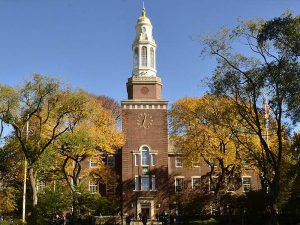

Last week, Brooklyn College was named by U.S. News & World Report (UNWR) as the “most ethnically diverse campus” in the Northern Region. The announcement marked BC’s third year in claim to the title from USNWR.
“This distinction is the latest affirmation that proves that when you bring people of different origins and ethnicities together, incredible things can happen,” Chief Diversity Officer Anthony Brown told the Vanguard. “Brooklyn College students come from more than 140 countries, and that offers a campus atmosphere unlike any other.”
According to BC’s most recent enrollment data, 24.74% of students are white, while 21.53% are Hispanic, 19.19% are Black, and 18.28% are Asian. Only .23% of students are Native American, and .16%, Pacific Islander. The remaining 15.88% are two or more races, or unknown.
While BC’s ethnicity is headlined, some at BC claim that the school’s claim to diversity is in name only.
“Many of us, who have been working for years to challenge racism on campus, only to encounter closed doors and cosmetic fixes, did not find cause for celebration,” the Anti-Racist Coalition at Brooklyn College told the Vanguard.
Over the summer, the Puerto Rican Alliance (PRA) published an open letter to President Michelle Anderson, detailing a set of demands for BC’s administration to combat racism. Shortly following the letter, Anderson released an outline for an Anti-Racist Agenda. The Agenda, among other things, promised the organization of a BC Implementation Team for Racial Justice, and six “listening sessions” on racial issues for BC’s community.
With the PRA’s demands not fully addressed by the Agenda, a number of other students and faculty formed the Anti-Racist Coalition (ARC) at Brooklyn College. The group released a combined set of demands on their website, criticizing the Anti-Racist Agenda on the grounds that “it exercises ill-informed unilateral decisions rather than a collaborative process with the very people who sustain Brooklyn College.”
Declaring racist culture and leadership at BC, particularly since Anderson took office in 2016, the group has cited Anderson’s repeated refusals to have an African American Policy Forum at BC. They list silences or inaction by the rest of the administration regarding requests from students and faculty for other changes.
“What such rankings ignore is that the College administration has rebuffed calls for a more community-centered approach to diversity, inclusions, and crucially, anti-racism, that ensures that those who make the College diverse and inclusive feel safe, secure, and affirmed at Brooklyn College,” ARC said of UNWR’s rating.
Most recently, the group cites Anderson’s lack of attendance at the Anti-Racist Agenda listening sessions.
BC’s first listening session of the fall semester, focused on staff issues, was hosted by Chief Diversity Anthony Brown on September 16th. A second session on student issues will be hosted on September 23rd, and a third on faculty issues will be held on September 30th.
“The diversity of our student population is a reflection of the borough that is our home and should be celebrated,” said Associate Professor and Chairperson of Africana Studies Prudence Cumberbatch. “It is important to keep in mind, however, that the diversity in front of the classroom is not as wide ranging.”
BC has not published statistics of its faculty and staff’s diversity.
“This homogeneity has implications on what can be taught, what can be intellectually examined, the types of discussion that can be had, and the ideas that can be exchanged,” said Cumberbatch.
The ARC has emphasized the hiring of more BIPOC faculty and staff, and one of the group’s demands is that the Africana Studies and Puerto Rican Studies departments, each with only five faculty members, be the first to receive faculty lines this school year.
While the diversity of BC’s student population matches the vibrancy of Brooklyn’s larger community, the ARC, Cumberbatch, and others believe more can be done to give voice to BC’s multitudinous body.
“We are proud of the student body’s diversity but we acknowledge that there is still much work to be done to address anti-Blackness, racism, and white supremacy at the College–even when there are BIPOC folks making the decisions,” said the ARC.

“Diversity should be reflected in all aspects of campus life; and when that is true, we have the potential to be a richer and more welcoming community,” said Cumberbatch.
Outranking campuses from Maryland to Maine in diversity, BC was also rated 6th by USNWR in social mobility, 15th best public regional university, and 33rd best university for veterans.
